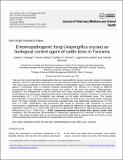| dc.description.abstract | Ticks are the most important ectoparasites that are responsible for severe economic losses in livestock
industry. The use of chemical acaricides is the most common method used to control ticks in livestock.
This study was conducted to determine the efficacy of Aspergillus oryzae as an alternative biological
agent in controlling ticks to enhance livestock productivity. The efficacy of A. oryzae at different
concentrations was evaluated against larvae and adults of the hard tick genera Rhipicephalus,
Boophilus, and Amblyomma using an immersion test under laboratory conditions. Field trials were
conducted in two purposively selected cattle herds in Monduli district, northern Tanzania. A. oryzae at a
concentration of 1 × 106 conidial/ml was sprayed on all cattle tick-infested areas. The results
demonstrated a concentration-related increase in mortality for both larvae and adult female engorged
ticks. The mean mortality of larvae and female engorged ticks was statistically significant at p ˂ 0.05
and p ˂ 0.001, respectively. Egg production was found to decrease with increased A. oryzae
concentration. Additionally, there was a statistically significant difference in egg production index and
oviposition reduction (p = 0.009) while there was no significant difference in egg hatching and product
effectiveness at p = 0.089 and p = 0.004, respectively between the tested ticks’ genera. Under field
conditions, the bio-acaricide demonstrated a statistically significant tick reduction in all the treated
cattle. This study concludes that A. oryzae has good acaricidal activity against ticks and hence, is one
of the potential tick control methods for sustainable tick control schemes. | en_US |

